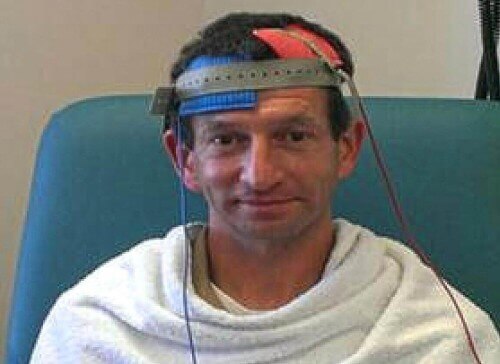A National Institutes of Health study found that non-invasive brain stimulation decreased calorie consumption and increased weight loss in adults who are obese. The findings suggest a possible intervention for obesity, when combined with healthy eating and exercise. Results were published in Obesity concurrent with a presentation at the 2015 Obesity Society meeting.
Led by scientists at the Phoenix Epidemiology and Clinical Research Branch, part of NIH’s National Institute of Diabetes and Digestive and Kidney Diseases (NIDDK), the team studied a total of nine men and women with obesity who resided in the Branch’s metabolic ward on two separate visits, each for eight days. On each visit, the participants ate a weight-maintaining diet for five days. Then for three days, they unknowingly received either active or sham (fake) transcranial direct current stimulation, or tDCS. Participants then ate and drank as much as they wanted from computerized vending machines. Applied to the scalp, the active tDCS targeted the brain region controlling behavior and reward.
The four people who got the sham stimulation during both visits consumed the same number of calories from the vending machines on each visit and did not lose weight. But the five people who got inactive stimulation on the first visit, and active tDCS at the brain target on the second visit, consumed an average of 700 fewer calories and lost an average of 0.8 pounds on the second visit.
Next, the researchers will compare a group getting only active tDCS with a separate group getting only sham stimulation. More study is needed to confirm the safety and effectiveness of tDCS for weight loss.
Article
M.E. Gluck et al. Noninvasive neuromodulation targeted to the lateral prefrontal cortex induces changes in energy intake and weight loss in obesity.Obesity 4 Nov.
Who
NIDDK Research Clinical Psychologist Marci Gluck, Ph.D., is available to comment on this study.
Contact
NIDDK Research Clinical Psychologist Marci Gluck, Ph.D., is available to comment on this study.To schedule an interview, please contact Krysten Carrera, 301-496-3583, [email protected](link sends e-mail).
The NIDDK, a component of the NIH, conducts and supports research on diabetes and other endocrine and metabolic diseases; digestive diseases, nutrition and obesity; and kidney, urologic and hematologic diseases. Spanning the full spectrum of medicine and afflicting people of all ages and ethnic groups, these diseases encompass some of the most common, severe and disabling conditions affecting Americans. For more information about the NIDDK and its programs, see www.niddk.nih.gov.



Thank you so much for your excellent coenmmt. A regular exercise program which includes both cardiovascular exercises such as jogging, cycling, fast walking etc. helps to control diabetes as well as to improve general health. Make sure your health care provider approves of these types of changes and if you are on medication to treat your blood sugar make sure you discuss the full effect of exercise on blood sugar. Some people require a snack or insulin adjustment when they embark on an exercise program. Stress is another factor that may adversely affect your sugars. If you go to the GYM and then sit around all day, you may not get the results you are looking for. Try to stay active during the day as well. Thanks again, Sybil and Tova.MEDICAL ADVICE DISCLAIMER: The information included on this site is for educational purposes only. It is not intended nor implied to be a substitute for professional medical advice. The reader should always consult his or her health care provider to determine the appropriateness of the information for their own situation, or if they have any questions regarding a medical condition or treatment plan. Reading the information on this website does not create a physician-patient relationship.
Good article. I retreated it @thebraindriver. If anyone is looking for a tDCS device, http://thebraindriver.com carries them.